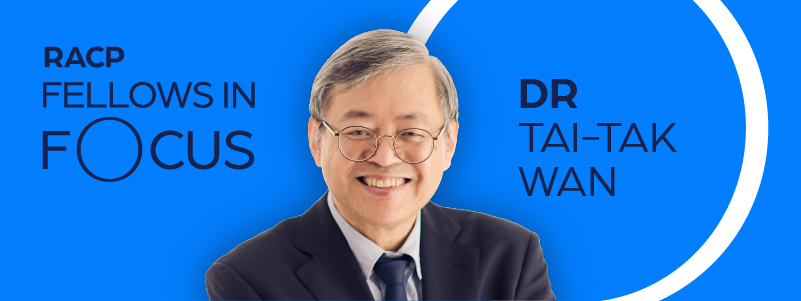RACP Fellows in Focus: Dr Tai-Tak Wan
Date published:
30 Aug 2021

With a background in rehabilitation medicine, Dr Tai-Tak Wan is the inaugural Director of Ambulatory Care at Fairfield Hospital. He has participated in various committees of the RACP’s Australasian Faculty of Rehabilitation Medicine (AFRM) and was a member of the RACP e-Health Advisory Group and RACP Integrated Care Working Group. He is currently a member of the RACP Health Reform Reference Group, AFRM Policy and Advocacy Committee and AFRM NSW/ACT Executive Committee. If that wasn’t enough, he also participates in the examination of AFRM and in the AFRM station setting group.
When asked about why he chose his specialty, he said, “When I worked as a neurologist in Hong Kong, patients with stroke were discharged if they survived the first few days, with no unusual complications, no matter how functional they were or the social situation. There was no real concept of rehabilitation 30 years ago in Hong Kong and I often asked myself, 'What will be the outcome of this patient and can we do better?' Especially if the patient is admitted because of a second stroke. Therefore, when I came to Sydney, I decided to study rehabilitation medicine, and later gained my fellowship in this area. I later obtained my fellowship in pain medicine, after working as an honorary Fellow in Westmead Hospital. I am now a VMO of the pain clinic at Liverpool Hospital.”
Working in this field, undoubtedly, requires a special skillset and Tai-Tak described why he felt he was perfectly equipped to handle the stresses and strains of the job, “I’m a team player, fairly good at communication and work hard. I’m an effective leader for a multi-disciplinary team and enjoy good support from my colleagues.”
He goes on to say that a holistic approach is “mandatory” for the management of patients, “The presenting problem is often just the tip of the iceberg. A good doctor should always consider five aspects of the patient i.e., medical, physical, functional, psychological and social. A patient is not just a case, but a human being living in a social or family environment. We must ask ourselves, apart from the medical diagnosis, what causes the problem? Why is the patient present at the hospital now? What is the impact on the quality of the patient, and the family? What’s the impact on their work or study? How do we prevent the same condition happen again? How can we avoid unnecessary admission? A presentation to our care is an opportunity for us to review the patient’s health holistically.”
When asked about the influences on his career, Tai-Tak was quick to mention that he’d like to be able to thank all those that have made an impact on his career, but there would be far too many to mention. However, he did caveat that by calling out two people. Professor Ben Marosszeky and Dr Joe Gurka. He noted, “Professor Marosszeky was the head of rehabilitation medicine and was patient, kind, helpful and approachable. Apart from showing me how to make coffee, from bean to cup, he taught me everything in rehab and pain medicine. In addition, Dr Joe Gurka was my mentor and the head of the brain injury unit. Ben and Joe provided a lot of support and helped me a lot in my first two years in Australia, which was initially quite difficult for me, as a new migrant to Australia, knowing nothing about the health system and hospitals here, and studied a totally new field.”
For aspiring Fellows of the College, Tai-Tak had some important notes, especially for those looking to rehabilitation medicine as a path to pursue, “You should be kind-hearted, holistic and patient-centred. You must also be a team player and comfortable with a multi-disciplinary team. If you want to do ambulatory care, be aware that it’s not recognised formally as a sub-specialty, yet. However, I have been pushing hard for it to be included as part of the AFRM or RACP.”
And for Tai-Tak, what are his next steps? How would he like to leave his lasting impression upon medicine? He said optimistically, “I believe I am one of the examples that doctors trained overseas can settle successfully in Australia, but hard work, persistence, and support from colleagues and maybe a bit of luck, are important. There is a lot of opportunity in Australia but taking the AMC examination may be the best first-step to allow more flexibility.”